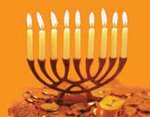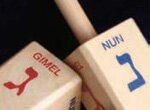| The importance of Chanukah |

|

|
There are a number of essays that explore whether Chanukah is relevant today. Once again we ask, is the lesson of Chanukah necessary in the modern world? Perhaps this year, we need Chanukah more than we have in many years. Unlike the Maccabees, we live in a world where we are allowed to practice Judaism. We have built great centres for learning and worship even in our adopted homes in Asia. Despite this, in the aftermath of Mumbai our idealism has been challenged. We are reminded that despite the legal freedom to worship in our own way and the freedom to express our Judaism, we are in danger. There are still those who single out people simply because they are Jews. We do need security and we do need protection. It should be recognised that in the face of modern terrorism it is not just us as Jews in danger but others too with shared values. Also, though we are not by any means forced into assimilating, the threat is real there too. Intermarriage is at an all time high and many people are fi nding it easier to move away from tradition. Chanukah again comes at an opportune time. It is a reminder again of the fragility of our sense of security in the modern world. It is a testimony to the strength of our faith and our peoplehood for it has truly stood the test of time. So yes, again on the twenty fifth day of Kislev, we will welcome Chanukah with our traditions and a sense of renewed meaning. Observation of this holiday is not complex and one that many who have abandoned other forms of practice still celebrate. Chanukah is one of the few Jewish holidays (other than those connected to the modern State of Israel) not mentioned in the Bible. Its story is found in Books 1 and 2 of the Maccabees. On the first night of Chanukah, we light the shamash or middle candle of the menorah. One candle is set to the far right of the menorah and another one is added each night for the eight nights of the festival. The candles are lit, using the shamash and beginning with the candle to the far left, lighting from left to right. Many people also place an electric menorah in their window and public menorah lightings have also become a common practice. There are three brachot recited on the fi rst night and two for each night following over the candles. On Shabbat, the candles of the menorah must be lit before the start of Shabbat (before the Shabbat candles) and the menorah, likewise, is lit after havdalah on Saturday night. To mark the central role that the oil played in the miracle of the fi rst Chanukah, foods fried in oil are traditionally eaten. While customs of worldwide Jewry may vary, many Jews eat latkes, fried potato pancakes. There are a number of creative variations on the traditional latkes. Also common are sufganiot or fried donuts. Again, there are a number of variations to the traditional donut, but the most common is perhaps the jelly donut rolled in powdered sugar. Communal meals are alsocommon, as is the giving of gelt or gifts. Gelt, or money, today is mainly given to children. Interestingly, the custom evolved out of a tradition of giving gelt to one's teachers. Dreidel is also played. While on the surface dreidel seems to be ‘just a child's game', it is one with great meaning and a rich history. The Hebrew letters printed on each of the dreidel's four sides are an acronym for the phrase: nes gadol hayah sham (a great miracle happened there.) The words (and the corresponding letters) are changed to from sham (there) to po (here) if the dreidel is in Israel. During the Greek-Syrian rule in the time of the Maccabeans, children were said to have pulled out spinning tops in order to trick the Greek guards into believing that they were merely at play. The dreidels, as decoys, allowed them to continue learning Torah despite the risk. We thankfully don't live in a world like the Jews of the time of the Maccabees, where our faith and practice is forbidden, yet there are a number of challenges to living and practicing in the modern world. The sense of renewal that Chanukah brings is still very much relevant in our lives. The continued celebration of The Festival of Lights is a welcome part of our tradition.  (Issue Dec 08/Jan 09)
|



















